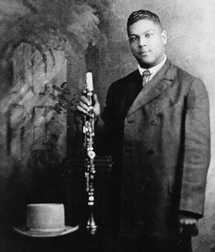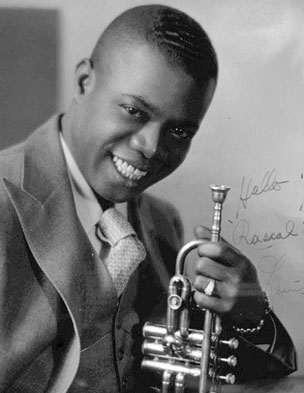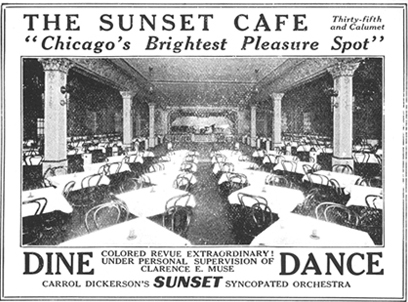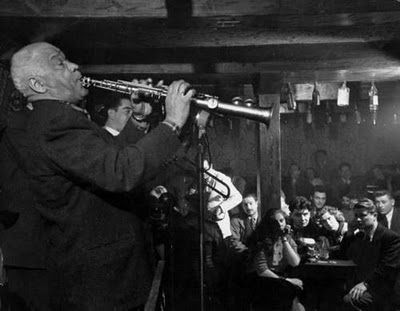.jpg)
Historic marquee photo courtesy of Empire Theatre.
This week’s episode of Riverwalk Jazz was recorded live at the gala opening of the historic Charline McCombs Empire Theatre in downtown San Antonio.
In the early 1900s jazz was the new music of the day, and New Orleans was the place to be. Cornetist Buddy Bolden improvised on the concept of the traditional New Orleans brass marching band and developed the five-piece ensemble—a portable, affordable jazz band that could play at dance halls, picnics and parties. Bolden’s new style contained the beginnings of jazz improvisation. His music was hot, played with passion at a loud volume. This gave his music the power and punch to be heard at dances before the days of amplification.

Portrait of young Sidney Bechet. Photo in public domain.
As the music began to evolve, two virtuoso soloists emerged on the New Orleans scene. Reedman Sidney Bechet and trumpeter Louis Armstrong both developed strong solo lead styles that formed the roots for jazz styles that would follow. Stage legend William Warfield sketches the historical backdrop for this musical drama on this broadcast with first-person accounts from early jazz sidemen.
New Orleans cornetist Bunk Johnson recalled how Louis Armstrong would follow him around just as Bunk himself had followed Buddy Bolden, learning everything he could: “Louis was eleven years old, and when he’d see me playing in a parade or marching band he’d tramp the streets all day long right with me. When the band stopped playing he’d be worrying me to carry my horn and wanted me to teach him how to play. Then when I saw he was really interested, I told him I would teach him, but he would have to do like I tell him, so I said to him, ‘You want to learn how to read music?’ ‘No,’ he said, ‘I don’t want to learn how to read music, I just want to learn how to play “Ballin' The Jack.“ ‘ “

Louis Armstrong. Photo in public domain.
In tribute to the genius of Armstrong, The Jim Cullum Jazz Band samples repertoire from various periods in his career. “Gatemouth“ from 1926 is a simple folk tune played in the improvised ensemble style of early New Orleans jazz bands. The title comes from an early Armstrong nickname. “Skid-dat-de-dat“ from 1926 and “Put 'em Down Blues“ from 1927 were both highly influential discs recorded by Armstrong and his Hot 5, which was strictly a recording group. Armstrong also recorded “Chicago Breakdown“ by Jelly Roll Morton in 1927; this time recording with the group Armstrong appeared with nightly at the Sunset Café, featuring Earl Hines on piano. “Swing That Music“ dates from 1936 at the beginning of the Swing Era. Jim Cullum remarks, “By the mid-30s Swing bands were coming on, and soon became the popular music of the day. Armstrong, who had created much of this Swing music, was, to a degree, being left behind in the popularity polls, at least temporarily.”

Sunset Cafe ad courtesy of Earl Hines and Stanley Dance Collection.
1920s hot jazz flourished in Chicago. New Orleans musicians King Oliver, Louis Armstrong, Sidney Bechet and many others migrated north to the Windy City to work in clubs like the Apex, the Sunset Café, the Dreamland, and Kelly’s Stables. Clarinetists Johnny Dodds and Jimmie Noone were influential New Orleans reedmen who made a name for themselves in Chicago. Johnny Dodds recorded his “Melancholy Blues“ (heard on this broadcast performed by The Jim Cullum Jazz Band) with the Armstrong Hot 5 and again with his own group.
Trumpeter Natty Dominique, a regular in clarinetist Johnny Dodds’ band, recalled what happened one night at the Club 29 in Chicago. He said, “One night I was over at Club 29 and clarinetists Johnny Dodds, Jimmie Noone and Barney Bigard were all there on the bandstand at the same time. Sidney Bechet came in and he said, ‘Hello, guys.’ And we said, ‘Uh, oh, here comes the devil.’ Bechet said, ‘We’re going to have a little fun tonight.’ Johnny Dodds said to Sidney, ‘All right, pull out your clarinet; I know you have it with you.’

Sidney Bechet in Paris, 1952. Photo by Nat Farbman.
Bechet put his clarinet together and got on the bandstand, and do you know, they all left that bandstand one by one. When I turned around Bechet was up there all by himself. He blew everybody off the stand. You never heard so much clarinet in all your life.“
Here, Evan Christopher joins The Jim Cullum Jazz Band to play two tunes in tribute to Sidney Bechet: “Petite Fleur,“ a hit tune Bechet wrote in 1952 while living in France, and the very hot “Sweetie Dear“ which dates from Bechet’s earlier Chicago days.
Photo credit for homepage image: Evan Christopher. Photo courtesy of the artist.
Text based on Riverwalk Jazz script by Margaret Moos Pick ©1998

